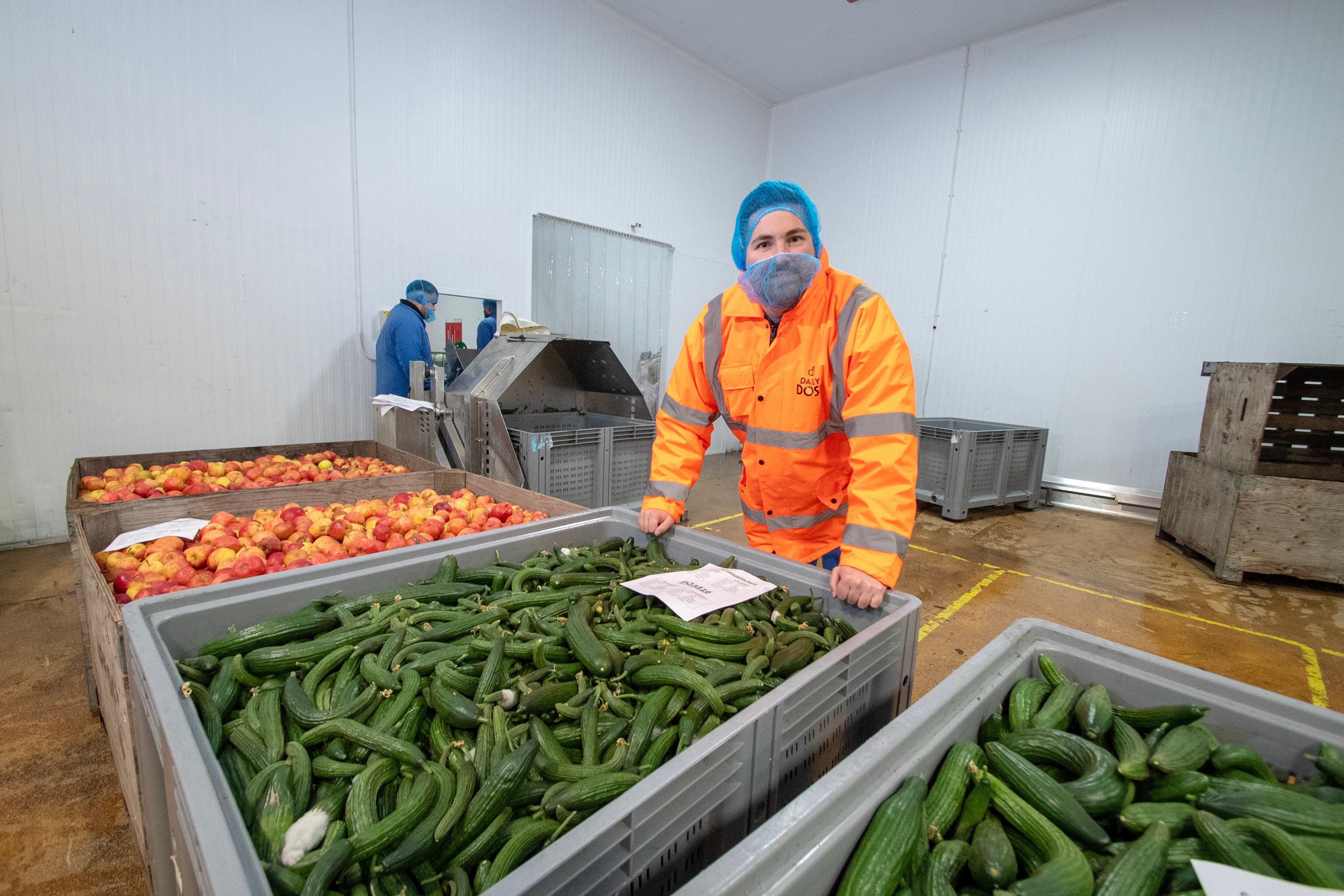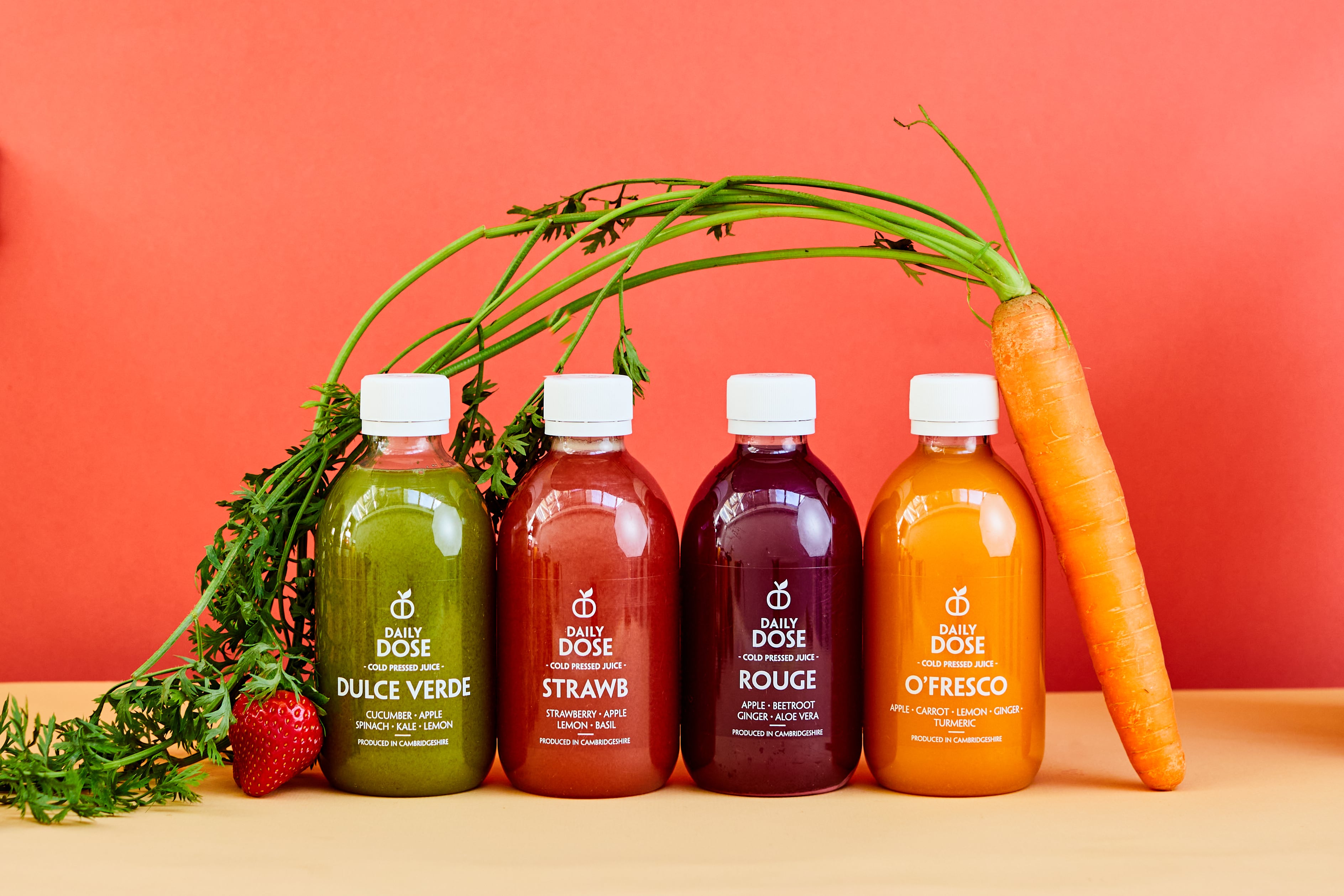Company: Daily Dose
Address: 88-89 Manton Rd, Corby NN17 4JL
Size of site: 90,000 sqft
Established: 2016
Products: Juices and smoothies
Investment into site: £8 million
Lines: Two juicing lines, four automated filling lines, two HPP lines and four packing lines
Output: 600,000 bottles a week
Employees: 70 members of staff
Beverage company Daily Dose has been going from strength to strength, with its revenue on track to reach £20 million this year, growing from £2 million in 2021.
From blender blunders to beverage brilliance
Its story begins in 2015 after founder and avid foodie, George Hughes-Davies, bought a juicer off eBay and begun making cold press juices at home.
Cold press simply refers to the extraction method used to get the juices from the whole fruits and vegetables. Hughes-Davies describes the process almost like a steam roller, with the pressure crushing and extracting the juice from the fibres.
Whilst Hughes-Davies noted this category was performing well in other European countries and the States, the UK was yet to cotton on.
Aged just 21 and fresh out of university after completing a politics degree, he took over his mum’s kitchen, whittling up a variety of vibrant juice blends. He remained in this set-up for 6 months before being kicked to the kerb (his mum’s driveway) following one too many ‘blender explosions’.
He continued his venture in a doughnut van he purchased online which he converted into a small juice production site.
“We were on the drive for maybe four or five months before we outgrew that. Then we moved to a rail arch in 2017,” Hughes-Davies said.
Hughes-Davies told Food Manufacture he’d been inspired by the microbreweries and small food companies he’d spied operating under rail arches in London and rented a disused rail arch of his own from Network Rail.
With a £25k loan from the Government, he fitted the space out with the appropriate kit and raised an additional £125k via a crowd funder – which went towards bottle storage, a walk-in chiller and additional staff.
“When we first moved to the rail arch, there was 2-3 of us working around the clock. So at night time we were going to pick up fruit from growers and suppliers, during the day we were juicing and then early morning we were delivering to customers across London,” he recalled.
Following this investment, Daily Dose won a contract with café chain Gails; and quickly moved to 24/7 production.
“We took Christmas off, but we were producing around the clock delivering to local cafes and restaurants.”
The business continued to see success, piquing the interest of an angel investor in 2019 at a pop-up it was hosting. Daily Dose ended up with several investors who injected £950k into the company, enabling the producer to move to a new site in Cambridgeshire.
The facility, which had been empty for two years, had once been a 2 Sister’s factory and seen good investment into refrigeration, flooring, draining and white walling.
“It was the perfect opportunity for us. We were able to come in, refurbish the site and then at that point, bring in the HPP machine.”

High pressure processing: ‘It was a huge gamble’
HPP is short for high pressure processing and is a non-thermal shelf extension life method. Once the juice is extracted and packaged, it’s placed into a water chamber with immense pressure (6,000 bars – or the equivalent of eight times the pressure found in the deepest part of the ocean).
The benefit of HPP compared to pasteurisation, according to Hughes-Davies, is that you maintain the product’s nutritional value, colour, flavour and smell, with the added benefit of an extra-long shelf life – an average of 40 days.
However, HPP is a high-ticket item and a much slower, more laborious process than its counterpart pasteurisation – and this is why many UK producers haven’t opted for it.
“At the time, we maybe had a revenue of 700k per annum. The HPP machine was £1 million – it was a huge gamble,” recalled Hughes-Davies.
“There haven’t been many companies that have really backed HPP as a technology – there’s only 7 machines in the UK; we’ve got two of them. This is vastly different to other countries, like Spain, Portugal and France, where there are many more of these machines.”
Despite the machine costing an eyewatering £1 million, it proved to be a worthwhile investment – and ticked off a goal Hughes-Davies had right from the start after he spied a gap in the UK market.
“There wasn’t a single HPP product in a supermarket when I first started Daily Dose. Back then, the UK was about 10 years behind [other countries], now I’d say we’re about five.”
Whilst Daily Dose is presently operating more in the premium category, Hughes-Davies believes both cold press and HPP hold an immense growth opportunity.
“We’re seeing a shift – supermarkets are more interested in looking at bringing cold pressed into their core range. It’s been a slow journey over the last eight years, but we’re really seeing a tipping point where people are now buying into it.
“It wouldn’t surprise me if, maybe in 10 years’ time they [big companies] do move into the space [of HPP and cold press].”
Veggies in vogue
But it isn’t just the combination of cold press juice and HPP that makes Daily Dose stand out, it’s also its ingredients. Hughes-Davies explained that as he’s scaled the business, he has tried to maintain the exact process he was using in his mum’s kitchen. Rather than creating a mixing plant with huge tankers of pasteurised juices which are mixed together, Hughes-Davies has filled his factory with fresh fruits and vegetables.
Data from the International Fresh Produce Association shows that for the four-week period ending 22 February 2025, fresh fruit sales accounted for $674 million and another $470 million in fresh vegetable sales for UK retailers in the Nielsen IQ universe.
The trend towards wholefoods, ‘natural’ and clean label continues to gain momentum and Hughes-Davies believes the future holds more veggies – and much less sugar.
I think the next big thing is the introduction of vegetables into recipes.
George Hughes-Davies
“We’re working on a smoothie range which incorporates vegetables,” Hughes-Davies added.
But it’s not just about the addition of vegetables in recipes, it’s also about the quality – with fresh fruit and veg key.
“Customers are now going to the likes of Joe and the Juice and know what a fresh juice tastes like. Lots of people are juicing at home too. And then expect the same when they go to the supermarket.
“No one’s making fresh smoothies using fresh fruit and veg and fresh juice anywhere in the UK. It’s all pasteurised, NFCs [not from concentrate] and purees.”
The company is also ensuring it has and maintains a strong sustainable message, working with seasonal products and sourcing as much as possible from the UK, alongside the use of wonky fruit.
Where it had initially been buying excess stock from the likes of Covent Garden market, Daily Dose is now buying out grades direct from supermarket supply chains. Meanwhile, any waste material goes into a local anaerobic digester where it’s turned into renewable energy.

Making big moves
Today, Daily Dose is situated in Corby – a site it moved to about a year ago and which represents an £8 million investment (including the building and machinery).
“When we moved up to the Corby site, we installed a new 12,000 bottle per hour filling line.”
In addition to this, the site is now home to a second juicing line, a second HPP machine, a new, and a bespoke smoothie line. This year also saw two senior appointments, with Phil Hurst and Ben Weeks joining the team as CFO and CCO respectively.
“This site is about five times bigger than the Cambridgeshire site, so it’s got the capacity for us to grow over the next 4-8 years.”
From its humble beginnings in the kitchen, when 200 bottles a day would have been a result, a good week can see around 600k bottles produced in a week.

